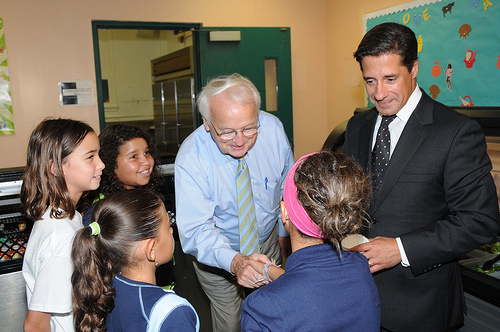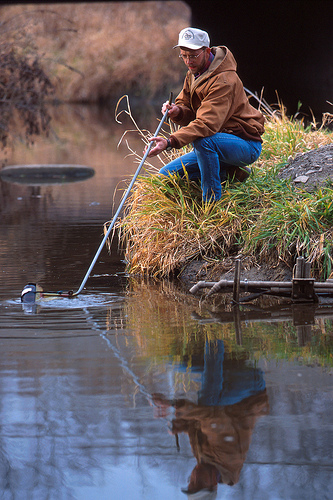
US Kevin Concannon and Miami-Dade County School Superintendent Alberto Carvalho talk with students from North Beach Elementary School, Miami, FL, on August 23, 2012, during lunch. (USDA photo by Debbie Smoot).
I recently had the pleasure of visiting North Beach Elementary School in Miami to recognize 177 schools in the Miami-Dade County Public Schools District for their efforts to promote good nutrition and physical activity to their students. All 177 schools achieved Bronze Awards in the HealthierUS School Challenge (HUSSC). Miami-Dade now has the honor of having the second largest number of HUSSC awards in any one school district in the entire nation. Read more »
Evelyn Eagleman, 63, remembers driving the long distance off Rocky Boy’s Indian Reservation, Mont., to rescue her grandson when he was two. His father was serving in the military and his mother had been arrested on drug charges. The boy needed a new start.
She brought the child home to Rocky Boy, where she and her husband, Francis, became the child’s foster parents. Her grandson, now a teenager, will soon graduate from high school and plans to major in forestry in college. Eagleman said she and her husband are proud of the man he has become and gives much credit to the Grandparents Raising Grandchildren program at Stone Child College, in Box Elder, Mont.
“There are a lot of legal issues involved with foster parenting, and I can’t remember them all, but with this program, I know where to go for help,” she said. “We learned about our rights as foster grandparents.” Read more »
The school day just got healthier! This year, thanks to the Healthy, Hunger Free Kids Act, students can expect to see healthier and more nutritious food on school lunch trays across the country.
To help navigate what these changes mean, you are invited to join National PTA President Betsy Landers, White House Chef Sam Kass, the Kids’ Safe and Healthful Foods Project, and USDA’s Administrator for the Food and Nutrition Service Audrey Rowe for a live discussion about the exciting new meals coming to school cafeterias. Use the hashtag #schoolfoodsrule to ask questions, give feedback, or just follow along! Read more »
“Back to School Week” is often the most thrilling and the hectic time for students (As a student I have experienced this first hand). The campus atmosphere is filled with excitement, expectation and the ringing of laughter. In between purchasing textbooks and memorizing course schedules students are busy reconnecting with old friends, making new ones, getting involved in campus activities and moving into their dorms. For many students in rural areas, these activities fade at the end of the day as they return home. However, there is a growing movement amongst rural community colleges to extend the college experience.
Colleges like Fulton-Montgomery Community College (FMCC) are offering dormitory housing to students. Students living on campus is common place at major colleges and universities however, is seldom seen in rural community colleges. This is changing. During a recent tour promoting “Back to School Week” Deputy Under Secretary for Rural Development Doug O’Brien discovered first hand just how so. Read more »

Maple leaves of many colors offer an unending palette of color in the United States Department of Agriculture, U. S. Forest Service, Hiawatha National Forest on the Upper Peninsula of Michigan.
U.S. Forest Service research indicates that climate change will affect habitat suitability for maple trees, threatening the multimillion dollar maple syrup industry. Changes in climate have already had an impact on the iconic sugar maple trees of the Northeastern U.S.
Flow of maple sap, which is boiled down to make syrup, is controlled by alternating freezing and thawing cycles in the late winter. Maple trees also rely on snowpack during this time to protect their roots from freezing. Read more »

ARS Technician Jeff Nichols collects a water sample from the Walnut Creek watershed in Ames, Iowa.
This post is part of the Science Tuesday feature series on the USDA blog. Check back each week as we showcase stories and news from the USDA’s rich science and research portfolio.
From ensuring the sustainability of our water resources, to breeding crops tolerant to changing climactic conditions, to preparing for the increased food demands of 9 billion people by 2050, finding solutions to the biggest agricultural challenges we face will require a new level of scientific innovation, coordination and long-term planning. As Iowa State University’s College of Agriculture and Life Sciences Associate Dean Joe Colletti recently put it, ag science is not rocket science – it’s more complicated than rocket science! Read more »



